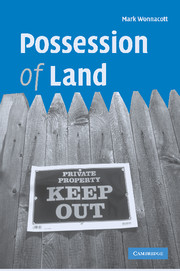Book contents
- Frontmatter
- Contents
- Preface and acknowledgments
- Table of cases
- Table of statutes
- Table of statutory instruments
- 1 Meaning of possession
- 2 Protection of possession
- 3 Possession, title and freehold land
- 4 Leases and licences
- 5 Mortgages and charges
- 6 Equity and trusts
- 7 Birth and death, dissolution and insolvency
- 8 Adverse possession and prescription
- 9 Possession judgments
- 10 Summary and conclusions
- Index
5 - Mortgages and charges
Published online by Cambridge University Press: 13 August 2009
- Frontmatter
- Contents
- Preface and acknowledgments
- Table of cases
- Table of statutes
- Table of statutory instruments
- 1 Meaning of possession
- 2 Protection of possession
- 3 Possession, title and freehold land
- 4 Leases and licences
- 5 Mortgages and charges
- 6 Equity and trusts
- 7 Birth and death, dissolution and insolvency
- 8 Adverse possession and prescription
- 9 Possession judgments
- 10 Summary and conclusions
- Index
Summary
Introduction
If land is power, then mortgage lending is the means by which power may be obtained on credit.
This chapter is about untangling the relationships between the debtor who has created the security over the land, the creditor who owns the security for the debt, and third parties who have some estate, right or interest in that land.
It is about who has the right to possess what, and who is ‘in’ possession of what, both before the credit runs out, and afterwards, when the secured creditor takes steps to enforce the security.
In order to untangle those relationships, it is necessary to untangle some of the legal history first; for, as in so much of land law, it is impossible to say where we are, without knowing how we got here.
Legal mortgages
The Law of Property Act 1925 reduced the number of legal estates in land to two; the ‘fee simple absolute in possession’, and the lease for ‘a term of years absolute’.
Both expressions are potentially misleading. A fee simple is ‘in possession’ even if it is subject to a lease, for ‘in possession’ here means ‘vested in possession’, and so includes the right to receive rents and profits; and periodic tenancies and tenancies for fixed terms of less than a year are deemed to be for a ‘term of years absolute’.
- Type
- Chapter
- Information
- Possession of Land , pp. 74 - 90Publisher: Cambridge University PressPrint publication year: 2006



